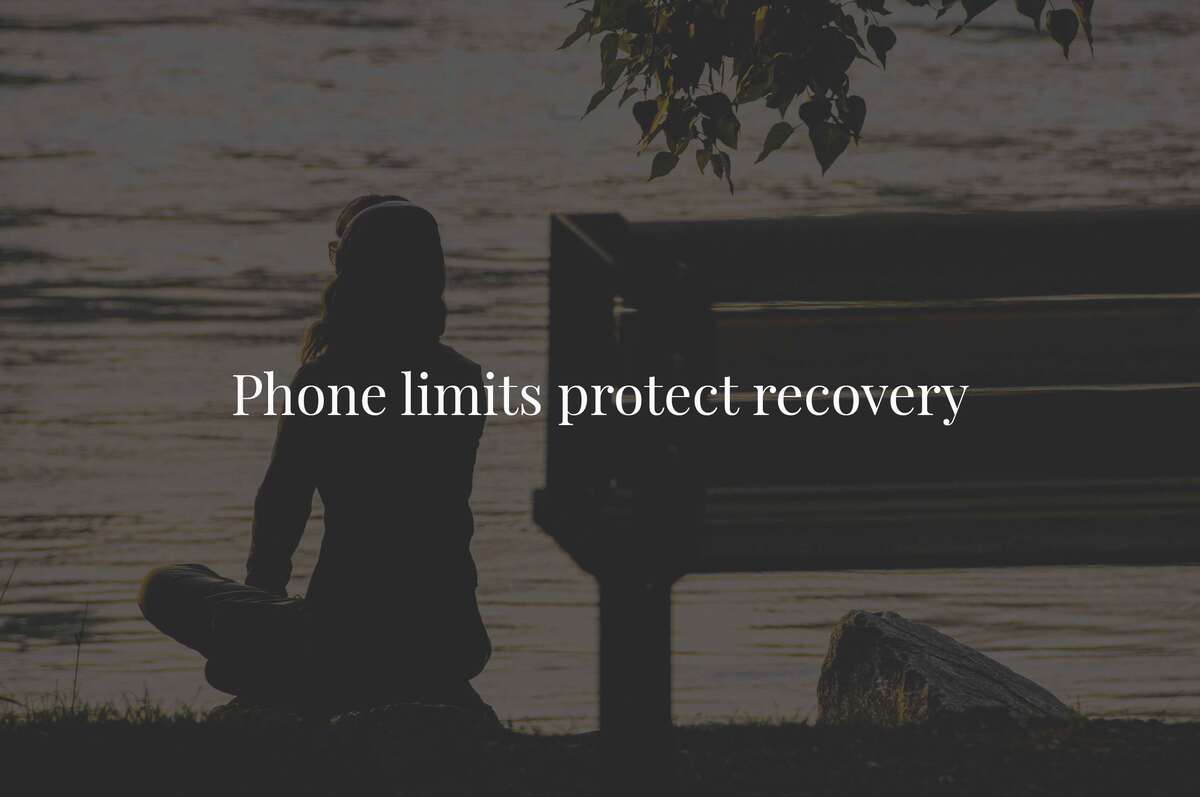Understanding Why Rehab Centers Restrict Phone Use
Most people entering treatment wonder if they can keep their phones. The short answer is sometimes—but with limits. Rehab centers regulate phone access because digital distractions, social pressures, and triggers from the outside world can undermine recovery. Early sobriety requires focus, and excessive communication or social media use can pull attention away from healing. Restrictions are not meant as punishment—they exist to protect progress.

The Purpose of Phone Restrictions
The first one to two weeks of rehab are often called the “stabilization period.” During this time, clients detox, adjust to structure, and begin therapy. Rehab centers limit phone access during this phase for three key reasons:
- Focus: Healing requires mental clarity and routine. Phones introduce stress, gossip, and emotional triggers.
- Privacy: Protecting every client’s confidentiality means controlling photography, recordings, or social media posts.
- Safety: Limiting external contact prevents negative influences, such as dealers, codependent partners, or enabling friends, from disrupting recovery.
After initial stabilization, many programs allow scheduled phone time, typically 10–30 minutes per day, supervised or in designated common areas.
Phone Rules Depend on the Type of Program
Phone policies differ among residential, outpatient, and partial hospitalization programs.
- Residential (inpatient) programs: Phones are often confiscated or stored for the first 7–14 days, with gradual reintroduction once clients demonstrate stability.
- Partial hospitalization programs (PHPs): Phones may be accessible during non-session hours but must remain off during therapy blocks.
- Intensive outpatient programs (IOPs): Most allow normal phone use since clients live at home, but communication guidelines still apply during sessions.
When choosing a facility, ask specific questions about digital policies before admission to set expectations clearly.
The Psychological Benefits of a “Digital Detox”
Phone restrictions can feel difficult at first, but the psychological benefits are substantial. The average American checks their phone 144 times a day, often without awareness. Constant connectivity floods the brain with dopamine spikes and cortisol-driven stress responses. Disconnecting for even one week reduces anxiety, improves sleep quality, and enhances attention span—effects that accelerate emotional healing.
Patients often report that after a few days without their phones, they experience deeper self-reflection, less social comparison, and more presence during therapy. Without constant texts and notifications, they can finally focus inward.

Balancing Connectivity With Recovery Needs
Rehab centers also understand that total disconnection isn’t always realistic. Many clients have family, children, or work obligations. That’s why modern treatment programs are increasingly flexible, offering:
- Supervised phone hours: Scheduled calls to loved ones or employers.
- Technology-free zones: Specific spaces for phone use that don’t interfere with therapy.
- Therapist-approved contact lists: Limiting communication to supportive people only.
- Gradual privilege systems: Phone access increases with progress and compliance.
This balance keeps clients connected to positive relationships while minimizing exposure to unhealthy influences.
When Limited Contact Is Beneficial for Families
For families, reduced phone contact can initially feel worrying, but it encourages boundaries and independence. Family members often play key roles in enabling addiction—through guilt, rescue behavior, or constant monitoring. Limited communication teaches both sides to detach lovingly, allowing the client to focus on healing and self-sufficiency. Most programs compensate for the lack of daily phone access with structured family therapy sessions and scheduled updates.
Preparing Before Admission
If you’re entering rehab soon, a few steps make the phone policy transition smoother:
- Inform key contacts—employers, family, friends—of your upcoming absence.
- Set an automated email reply to handle work inquiries.
- Store important numbers on paper in case you need supervised calls.
- Delete triggering contacts or apps that could derail recovery post-treatment.
- Bring a list of approved people to add to your call schedule once permitted.
Alternatives for Staying in Touch
Some programs use monitored communication systems that allow safe connection without constant exposure. For example:
- Family liaison calls: Weekly updates facilitated by staff.
- Secure messaging platforms: Internal rehab apps or portals for check-ins.
- Visitation days: In-person family time that replaces casual texting.
These structured forms of contact build trust and reduce anxiety for both clients and loved ones.
The Role of Phones in Outpatient Care
For outpatient programs, phone use is typically unrestricted outside of therapy sessions. However, clients are encouraged to use phones intentionally—tracking medication, scheduling therapy, and connecting with sober support networks. Using productivity or mindfulness apps can turn the phone from a trigger into a recovery tool.
Apps like I Am Sober, Headspace, and Sober Grid help track milestones, manage cravings, and maintain accountability after treatment ends. Many graduates of inpatient rehab integrate these digital supports into daily life successfully.
Transitioning Back to the Real World
When treatment ends, phone freedom returns—but boundaries must remain. A phone can reconnect you to support or reintroduce stress and temptation. Counselors typically recommend:
- Limiting screen time to 1–2 hours of non-essential use per day.
- Avoiding social media during early recovery months.
- Blocking triggering contacts permanently.
- Scheduling “digital-free” hours before bed for sleep hygiene.
- Using accountability partners or sober apps for positive reinforcement.
These habits protect progress once structure fades and distractions resume.
Why Responsible Use Is a Life Skill
Rehab isn’t about disconnection—it’s about rewiring relationships, including your relationship with technology. Learning to pause before reacting to notifications, limit doomscrolling, and replace impulsive texting with mindfulness reflects the same emotional regulation skills learned in therapy. In this way, digital boundaries become relapse-prevention strategies.
Studio City Recovery’s Balanced Approach
At Studio City Recovery’s rehab center in Studio City, phone policies are built around balance. Clients earn privileges as they progress, maintaining contact with supportive family members while staying focused on treatment. Structured tech use reinforces accountability without cutting off essential communication—ensuring that recovery strengthens real-world readiness rather than isolation.
Conclusion
You may not have unlimited phone access in rehab, but that’s by design. Limited use fosters self-awareness, deeper engagement, and healthier boundaries with both people and technology. The temporary separation helps reset dopamine-driven habits and cultivates calm. When used intentionally, the phone becomes a recovery ally instead of a distraction. Rehab isn’t about losing connection, it’s about learning how to connect meaningfully, both digitally and emotionally, once again.




